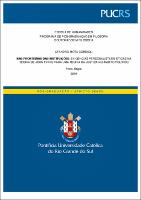| Share record |


|
Please use this identifier to cite or link to this item:
https://tede2.pucrs.br/tede2/handle/tede/8719| Document type: | Tese |
| Title: | Nas fronteiras das instituições : exigências personalistas e éticas na teoria de John Finnis para uma teoria da justiça no âmbito político |
| Author: | Cordioli, Leandro Mota  |
| Advisor: | Souza, Draiton Gonzaga de |
| First advisor-co: | Oliveira, Elton Somensi de |
| Abstract (native): | O presente trabalho busca desafiar o paradigma contemporâneo que compreende a justiça como uma virtude institucional. A tese propõe que a justiça é fundamentalmente uma virtude ética dita a partir do caráter das pessoas, o que traz consequências práticas para o bem de uma comunidade política. Há dois grandes modelos de estudo da teoria da justiça que são rotulados como Personalismo Ético e Institucionalismo Político. O Personalismo Ético abrange as teorias da justiça, cujo caso central é estabelecido a partir das pessoas e da esfera Ética, como no caso de Sócrates, Platão, Aristóteles, Tomás de Aquino e John Finnis. O Institucionalismo Político contempla aquelas teorias contemporâneas da justiça que a consideram um atributo de instituições políticas e jurídicas, preocupando-se fundamentalmente com a razoabilidade e a justiça dos critérios de distribuição de bens e encargos em uma comunidade política, como o faz John Rawls. Segundo esse enfoque, instituições justas são uma condição necessária para que a sociedade seja justa, contudo não são uma condição suficiente para garantir o bem comum. Uma garantia melhor somente pode ser oferecida se houver uma preocupação com o caráter dos cidadãos e dos governantes, tal garantia faz com que exista uma exigência de razoabilidade pública de que a comunidade política se preocupe com a formação de virtudes cívicas que abranjam a esfera Ética. Por isso, a teoria da justiça de John Finnis exerce um papel central nesta demonstração. |
| Abstract (english): | The present work seeks to challenge the contemporary paradigm that understands justice as an institutional virtue. The thesis proposes that justice is fundamentally an ethical virtue of the person’s character, which brings practical consequences for the good of a political community. There are two major models of justice theories that are labelled as Ethical Personalism and Political Institutionalism. Ethical Personalism includes the theories of justice that ascribe it's central case to people and the Ethical sphere, as is in the case of Socrates, Plato, Aristotle, Thomas Aquinas, and John Finnis. Political Institutionalism contemplates those contemporary theories of justice that consider it as an attribute of political and juridical institutions, being fundamentally concerned with the reasonableness and justice of the criteria of goods' distribution and charges in a political community, such as John Rawls. Thus it is held that fair institutions are a necessary condition for society to be just, yet they are not a sufficient condition for securing the common good. A better guarantee can only be offered if there is a concern with the character of citizens and rulers, which makes it a requirement for public reasonableness that the political community be concerned with the formation of civic virtues that embrace the Ethical sphere. Therefore, John Finnis' theory of justice plays a central role in this demonstration. |
| Keywords: | Teoria da Justiça Estado de Direito Personalismo Ético Institucionalismo Político |
| CNPQ Knowledge Areas: | CIENCIAS HUMANAS::FILOSOFIA |
| Language: | por |
| Country: | Brasil |
| Publisher: | Pontifícia Universidade Católica do Rio Grande do Sul |
| Institution Acronym: | PUCRS |
| Department: | Escola de Humanidades |
| Program: | Programa de Pós-Graduação em Filosofia |
| Access type: | Acesso Aberto |
| Fulltext access restriction: | Trabalho será publicado como artigo ou livro |
| Time to release fulltext: | 60 meses |
| Date to release fulltext: | 14/06/2024 |
| URI: | http://tede2.pucrs.br/tede2/handle/tede/8719 |
| Issue Date: | 25-Mar-2019 |
| Appears in Collections: | Programa de Pós-Graduação em Filosofia |
Files in This Item:
| File | Description | Size | Format | |
|---|---|---|---|---|
| TES_LEANDRO_MOTA_CORDIOLI_COMPLETO.pdf | LEANDRO_MOTA_CORDIOLI_TES | 1.37 MB | Adobe PDF |  Download/Open Preview |
Items in DSpace are protected by copyright, with all rights reserved, unless otherwise indicated.




